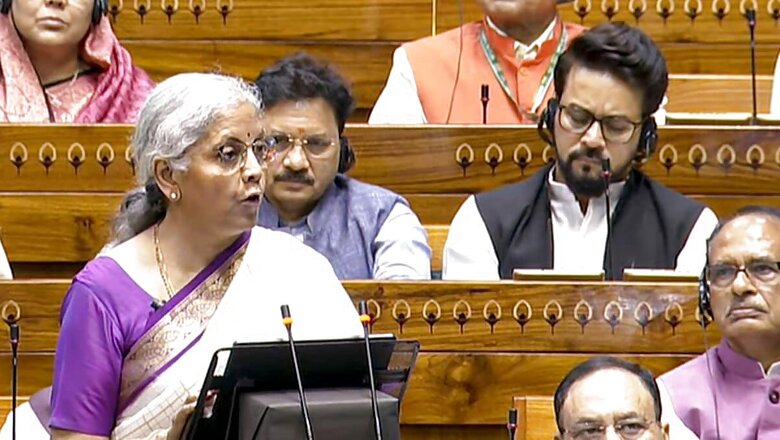
views
In one of the major decisions, Finance Minister Nirmala Sitharaman in the Budget 2024-25 has proposed to reduce the long-term capital gains (LTCG) tax on property sales from 20 per cent to 12.5 per cent. However, she has also removed the indexation benefit to adjust for inflation. Experts say the impact of the decision will not be the same for all property sellers, adding that those who bought property as recently as in 2018-2019 or at very low cost will benefit from the Budget 2024 changes, while others will be adversely affected.
According to the Memorandum to the Union Budget, “Simultaneously with the rationalisation of rate to 12.5 per cent, indexation available under the second proviso to section 48 is proposed to be removed for the calculation of any long-term capital gains which is presently available for property, gold, and other unlisted assets. This will ease the computation of capital gains for the taxpayer and the tax administration.”
Case 1: Those Who Purchased Property Recently and Are Selling Now
Sharad Kohli, a tax expert, said, “Those who bought property recently, like in 2018 or 2019, and are planning to sell now, the indexation was anyways less useful for them as the inflation of 5-6 per cent over that short period does not make much of a difference. However, the cut in long-term capital gains tax will significantly benefit them,” he added.
Kohli also mentioned that the cost of acquisition matters here. “If the cost of acquisition is very low, even if purchased long ago, the Budget 2024 changes will benefit.”
He, however, also said that the Budget 2024-25 changes should be seen as a mixed bag and evaluated on a case-by-case basis.
Case 2: If Property Was Purchased Long Ago and Is Being Sold Now
A tax expert, who did not want to be named, told news18.com, “Those who purchased property in the last decade stand to lose after the indexation benefits are removed. For example, if you bought a property in 2005 for Rs 1 lakh and are planning to sell now for Rs 5 lakh, the 12.5 per cent tax will simply be levied on the Rs 4 lakh capital gain. However, earlier, the cost of property used to be indexed to the year of selling as per inflation. For instance, if the cost of the property has risen to Rs 3 lakh after adjusting for inflation, the LTCG would have been imposed on just Rs 2 lakh.”
Currently, the Cost Inflation Index, based on which indexation is calculated and which has been fixed at 100 in 2001, is currently at 363. It means the property bought in 2001 at Rs 1 lakh is considered purchased at Rs 3.63 lakh now.
Case 3: Those Who Bought Before 2001
As per the capital gains provisions, the current indexation year is 2001. So, every property bought before that year will be first priced as per the 2001 prices and then further calculations like inflation and LTCG are done. For example, if an ancestral property was bought in, say, 1965, the cost of the property of 1965 is not taken into account for capital gains. It is considered that the property was bought in 2001, and the prices are realigned as per the 2001 price, to be exact April 1, 2001, for further calculations.
Feroze Azeez, deputy CEO of Anand Rathi Wealth, said, “For those who have ancestral property bought before 2001, the tax will be imposed on gains only from the current century (after April 2001).”
The indexation benefit will continue to be applicable on properties bought before 2001, Finance Secretary T V Somanathan has clarified in the post-Budget press conference.
What Does the Government Say?
Somanathan said, “If you assume the rate of return on real estate above 10 per cent per annum and inflation at 4 per cent per annum, the real rate of return was, let’s say, around 6-16 per cent. If it is 16 per cent, then 20 per cent of 16 per cent was being taxed. The effective rate was 16 per cent. It has gone down to 12.5 per cent. If the rate of return was annual 10 per cent nominal, it has also remained approximately the same at 12.5 per cent. So, actually, either there is a reduction or no change in respect of the effective rate of tax on property and gold.”
Importantly, apart from real estate, the 12.5 per cent LTCG and no indexation provisions will also be applied to gold.
In 95 per cent cases, the 12.5 per cent will benefit. Due to this change, the middle class will benefit, the finance secretary said.
The income tax department, in a series of posts on X, said, “The reduction in long-term capital gains tax rate from 20 per cent with indexation to 12.5 per cent without indexation for real estate will benefit in almost all cases.”
It said nominal real estate returns are generally in the region of 12-16 per cent per annum, much higher than inflation. The indexation for inflation is in the region of 4-5 per cent, depending on the period of holding. Therefore, substantial tax savings are expected for a vast majority of such taxpayers.
Benefit of change in rate from 20% (with indexation) to 12.5% (without indexation) in real estate✅The reduction in long term capital gains tax rate from 20% with indexation to 12.5 % without indexation for real estate will benefit in almost all cases.@nsitharamanoffc…
— Income Tax India (@IncomeTaxIndia) July 24, 2024
“For property held for 5 years, the new regime is beneficial when the property has appreciated 1.7 times or more. For property held for 10 years, it is beneficial when the value has increased to 2.4 times or more. For property purchased in 2009-10, if the value has increased to 4.9 times or more, it is beneficial,” the income tax department said in the posts.
From the above examples, it is clear that only where returns are low (less than about 9-11 per cent per annum) that the earlier tax rate is beneficial. However, such low returns in real estate are unrealistic and rare, it added.
However, Mohandas Pai, the former CFO of Infosys and partner at Aarin Capital, urged Prime Minister Narendra Modi to ask the income tax department to give data how they can say nominal real estate returns are 12-16% per annum. Seems to be a wrong assumption.they withdrew indexation on this wrong assumption. Pl reinstate indexation till April 1, 2024.
“Tax payers are very upset about removing indexation,” Pai added.




















Comments
0 comment